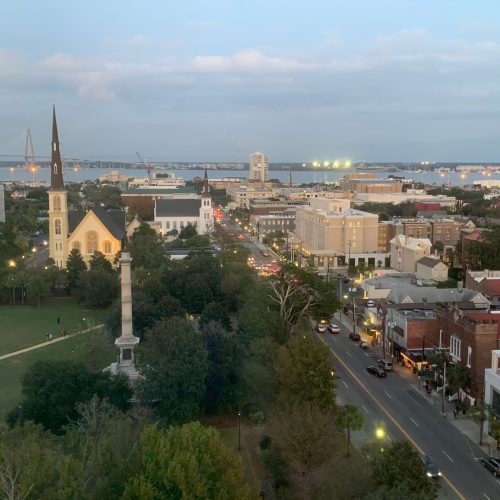 The Charleston Conference is one of my very favorite conferences and this year did not disappoint. But as we did have 5 ZSR folks attending, I’ll keep my comments to things I think I attended that others did not, so we don’t all repeat the same info about the same sessions.
The Charleston Conference is one of my very favorite conferences and this year did not disappoint. But as we did have 5 ZSR folks attending, I’ll keep my comments to things I think I attended that others did not, so we don’t all repeat the same info about the same sessions.
Vendor Interaction:
I find the best part of Charleston to be the vendor aspect. The vendors hall is restricted to a showcase on Tuesday only and at that each vendor has the same-sized table (very egalitarian). After that, the vendors are in the sessions with all of us – sometimes contributing to a panel, but more often just in the audience listening and asking questions. Then there are a ton of side meetings, dinners, coffees, etc. with vendors where you get to have much more meaningful conversations. So here is a bit of insight into the vendor aspect of my conference:
- SAGE purchased a very interesting company last year named Talis. Talis is huge in the UK and is looking to expand into the US. I was invited to a dinner on Tuesday evening where six or seven librarians served as a focus group for them as the think about this expansion. What Talis provides is essentially a plug-in for learning management systems that allows for a seamless interface for building reading lists from textbooks (links to your bookstore), library collections, free web sources and OER sources. It also has a plugin (kinda zotero-like) that when you find something you want to add to a course while you are out on the web (not in your CMS), you can add it to your course right from the browser. It’s super impressive – I’m just not sure where the money for it would come from in our case – is it a library resource? A CAT resource?
- Readex: I met with three folks from Readex to give my input on products they are considering pursuing. All were primary source collections and it’s super fun to hear where they are headed and give my feedback.
- SAGE: I had another meeting with SAGE about a product they are considering that would be focused on soft skill development for student success mixed with academic content – will be interesting to watch how they develop it.
- Ebsco: I had lunch with our Ebsco reps – their new level of database is going to be called ‘Ultimate’ – which makes me wonder what they will do next. “Academic Search WOW” or “Academic Search Awesome” – if you are keeping track – their levels now are ‘elite,’ ‘complete,’ ‘premiere,’ and now ‘ultimate’
- A trip around the vendor showcase gave me a chance to touch base with a bunch of vendors about products (even got a GOBI interface question answered). I found out that the IMF is making all of their content free after January 1 (great news), and got some clarification about subscriptions to the country reports from The Economist (which are amazing but not cheap). There are a lot of cool products I learned about but the best, for me, by far was this one from Adam Matthew. Adam Matthew has a new product that would be a subscription access for their entire platform. No word on how many arms and legs it would cost, but would be amazing to have.
Session Takeaways
I went to several really great sessions, and was on a great panel about teaching mis/disinformation with colleagues from Emory and Drake Universities that I think will morph into other presentations and publications in the upcoming year. We had great chemistry together and are each doing really interesting things that may give us chances for collaboration.
A few foods for thought from the sessions I attended are below:
- A session on data privacy for patrons was thought provoking. Darby Orcutt from NCSU posed an interesting thought – do we protect patron privacy too strictly? Are we protecting patrons against the possibility of a very rare occurrence (The FBI shows up and wants to know who was searching for books on making bombs) at the expense of not keeping data that could help students ward of much more likely problems (wanting to see what book they checked out last year) or even provide libraries or the universities with information about library usage that can help us find factors contributing to student success. The University of Michigan has even changed their Privacy Policy to indicate that they do collect some user information “in order to improve services and to integrate with broader University teaching and learning initiatives.” Provocative and certainly a double-edge sword but gave me lots to think about.
- An adorable session (that was run as a game show) about how students evaluate research results highlighted ‘container collapse’ – the idea that as we encounter things online, it is really hard for students to tease out the ‘container’ the information is in – is it a book? A magazine? A journal? A blog? When context cues are gone, what do they rely on. What they found was that students DO look at URLs, they don’t know what a preprint is, if it’s in JSTOR they assume it’s a journal, unhelpful names like ‘XX Online Library” makes them think it’s books, even if it’s a journal article, and determining if something is a blog or not is tricky. Super interesting.
- NCSU did a really interesting dual study (one was an Ithaka S+R study of engineering faculty, the other was of a broader swath of faculty but used some of the Ithaka-type questions and methodology) of research habits among faculty and are rethinking how they brand the services they can provide pulling in resources available elsewhere on campus. I’m hoping we can talk to them more about how they are developing this idea – it has implications for DISC as well as RIS and CAT.
- I went to a session where Temple, University of Montana, and The New School all talked about how the used Primo with Alma to tweak their discovery layer. Some good examples of things to check out as we head toward our own implementation.
I won’t be at Charleston next year because it will over election night and I’m going to need to be among friends and family, but I hope to be back in 2021. It really is a lovely city and a wonderful conference.

7 Comments on ‘Roz @ Charleston Conference’
Ebsco eXtreme! (But really, why so many tiers?)
The “container” issue is really interesting. For all the grumbling about focusing too much on teaching students formats, I DO think it’s important for students to be able to tell what exactly it is they are looking at when Google Scholar dumps them into some random PDF. And that requires teaching formats!
Wow – so much to think about! We’ll have to talk more about the primary sources collections to looked at, and yes, subscription access to all of Adam Matthews would be incredible! I definitely want to discuss the study on faculty research habits and branding services to support them. Thanks for sharing!
Your recap of this conference always makes it sound so great. I think your vendor experiences make it very worthwhile, but love the recap of the sessions. I love the “container” problem that was so elegantly approached in their game show fashion. Win-win.
Good to know what sessions you hit that I did not! The privacy session definitely sparked lots of thoughts…Kyle and Alice were there too, so perhaps local convos will grow out of that. And if the NCSU study is the one I think it is, there are definite synergies for RIS and DISC!
Very provocative ideas about user privacy – I think plenty of institutions and companies aren’t up front about their policies and info collection, so that woudl be an improvement at the very least!
Thanks for this varied report!
I’m so glad that the Charleston Conference still provides that great opportunity to give opinions to vendors. I’ve found that building good relationships with our vendors in the ways you described has resulted in their listening closely to our problems and needs. They want to provide quality services and products to our patrons as much as we do.
Regarding privacy, the recently updated interpretation to the American Library Assocation’s Library Bill of Rights includes this text: “Additionally, users should have the choice to opt-in to any data collection that is not essential to library operations and the opportunity to opt-out again at any future time. All nonessential data collection should be turned off by default. In all areas of librarianship, best practice leaves users in control of as many choices as possible regarding their privacy. This includes decisions about the selection of, access to, and use of information. Information about options available to users should be prominently displayed, accessible, and understandable for a general audience. ” Interpretation located at http://www.ala.org/advocacy/intfreedom/librarybill/interpretations/privacy. I was involved in some of the processes to update several interpretions while I was the Chair of ALCTS Advocacy and Policy Committee– many people may not be aware that there were numerous calls for input and feedback on drafts during the process.
If you’re going to miss the Charleston Conference next year, might I recommend the NASIG Conference? It has many of the same vendors in a non-sales pitch environment, with a limited vendor expo. Plus, it’s much cheaper than the Charleston Conference, and it is run by a membership organization, while the Charleston Conference is a privately-owned, for-profit operation.